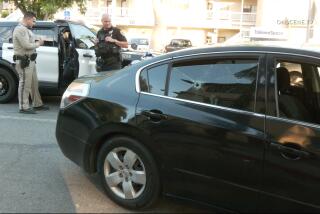Shooting Gallery
- Share via
Nine times since mid-June, Southern California motorists have fired in anger at other motorists and one pedestrian who have somehow given offense on a crowded road. Four people have died in these senseless flare-ups, and law-enforcement officials worry that the attacks may be the start of a trend.
There is precious little that the average careful driver can do about it except hope that the police are wrong. Radar can spot a speeder, but the law has no device that can spot an armed driver under the kind of stress that would make him kill because he couldn’t pass a car or had to slow to avoid someone climbing a freeway ramp.
Psychiatrists say that stress is increasing everywhere, not just in the fast lane--of which there are all too few these days. The stress of traffic jams pushes some drivers to the boiling point, and the number of traffic jams is spreading and the pace is getting slower. There are twice as many miles of stop-and-go freeway traffic in Los Angeles County during the morning and evening rush hours as there were 20 years ago.
Because society is everywhere more violent, they say, it stands to reason that a blast of the horn no longer is enough to work off aggression; now it takes a blast of gunpowder. Part of the problem obviously is the cavalier attitude of California law toward restrictions on the number of handguns loose in society, although recent gun sales haven’t matched the spurt in highway violence.
But neither police nor analysts are much help when it comes to reassurance that there is some way to keep your particular stretch of freeway from turning into a shooting gallery. Therapists prescribe deep-breathing exercises and other tricks to keep the tension low in one car, but there is no way for the driver who has himself under control to tell how deeply the driver behind him may be breathing.
A California Highway Patrol spokesman says that the best advice is “don’t get involved”--advice that reminds us of a safari guide’s instructions to clients if they should come upon a family of lions. “Avoid eye contact,” he said. Yet that may be close to the answer--driving as though it were the most important thing in the world to avoid giving offense, driving as though your life depended on it.
More to Read
Sign up for Essential California
The most important California stories and recommendations in your inbox every morning.
You may occasionally receive promotional content from the Los Angeles Times.













